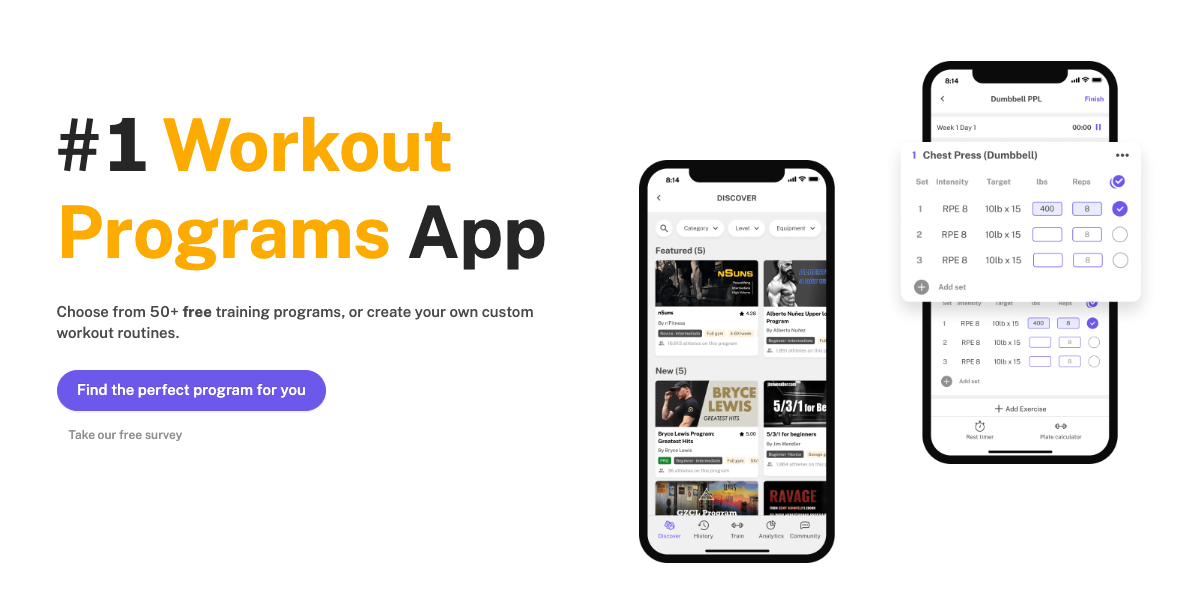How to Deload on a Workout Program
Written by the Boostcamp staff
How to Deload on a Workout Program: Expert Advice
Improving progress by doing less
When it comes to your workout routines, you may think that constantly lifting more and more is going to benefit your progression, whether you are adding weight to the barbell or repetitions to your sets; just overloading nonstop makes the gains right? Not necessarily. The concept of a “deload” may be foreign to some, but for people following a workout program that has them lifting with a good amount of frequency and intensity, a deload can be necessary to pack on muscle size and add strength.
Boostcamp’s very own Michael Liu sat down with Dr. Eric Helms to discuss what a deload is, and how to properly implement it into your workout regimens, whether you are training for powerlifting or even bodybuilding.
What is a Deload?
So, to those of you that may not know exactly what a deload is, let’s discuss. Many have the idea that a deload is just going into the gym for a week and hitting light weights and mediocre workouts, basically just getting a quick pump. However, it is much more than that if you want to see some serious progress.
In weight training, a deload is a period of time in which you reduce the amount of weight and volume that you train at. A deload is typically a week-long period of training sessions. The idea is that it provides your body a break from your grueling, heavier load workouts so that you get a break both mentally and physically, and can recover faster and more efficiently. Deload weeks are recommended every 8-to-10 weeks of hard training in programs like Bigger Leaner Stronger and Thinner Leaner Stronger.
A deload week also allows you to focus on the mind-muscle connection much better. This is another aspect of lifting that many athletes do not pay enough attention to, and instead go through the motions. A deload enables you to really get the movements down to a science and activate the muscle fibers like never before. Additionally, you might also consider using your deload week to emphasize recovery practices like mobility work, yoga, and meditation that you can also integrate into your regular routine.
When to Use a Deload

Pictured: Hunter Bales squatting
Dr. Helms describes the need for a deload as you are carrying stress over, from microsession to microsession, to the point where it builds up and impacts your ability to induce progressive overload. Continuing to build up that stressor can help lead to injuries. That being said, you would need a break from the heavy weights and volume that you are at, in order to move forward and avoid hitting a plateau.
He then goes on to describe when exactly you would want to use a deload week. He says that if you are on a program where you are training only 2-3 days a week, then you have 4-5 days to recover, so a deload would not necessarily be beneficial. But, if you are on a program where you are training 4-5 days a week, especially if you are in the competitive space or have some serious recreational goals, you may have some lingering fatigue going from session to session, which can start to hinder your strength gains.
This can result in the weights feeling heavier and heavier, for example on a compound movement like the barbell squat. If you squat 225 for 5 reps on Monday, then go through your week of training and the next Monday you feel as though it is harder to squat 225 for 5 reps, then that means the stress from strength training is piling up. This is a case where a deload week may be beneficial for your overall well being.
Now, Dr. Helms goes on to say that you should not need a deload all that frequently, for example you should not need one every other week, or even every third week. He states that it should be an adaptive strategy where you go through a checklist and decide that a deload can be good, which is usually every 6-12 weeks.
Is a Deload Necessary?

Pictured: Jake DiCesare deadlifting
Is it necessary to take a deload week? No, but it is beneficial every now and then, especially when trying to peak for a powerlifting meet. However, many people are using programs that really are not making them push the envelope to the point where a deload is necessary, meaning they are not fatigued at all. If that is the case, you may want to find a new program to follow where you can set and exceed goals, and it is solid forward progress.
Pros and Cons of Deload Weeks
When it comes to implementing something into your training, there are always going to be pros and cons that come with it. So, what are the pros and cons of taking a deload week?
Pros
Enhances ability to utilize mind-muscle connection
Aides in recovery process
Helps progress
Cons
May not be as fun of workouts
Look we get it, we all love throwing around heavy weights and hitting drop sets until you hit muscular failure, hitting 1 rep maxes continuously, and for that reason, taking a deload week may not be the most fun time to be in the gym. However, if your body is telling you that you need to take a deload, then you should listen to your body, it can help you in the long run. Taking a deload week a little bit before competition time can help your body come back rested and stronger.
What Does a Deload Week Look Like
So, what does it even look like? Is it just going into the gym and stretching? Or benching half your weight? No, a proper deload typically is about 70% or less of your regular working weight and volume. You are still utilizing the same exercises, but the working sets will be at 70% or less of what you normally do.
Rather than focusing on the intensity of your training, instead take this time to dial in your form and muscle fiber activation, so then when you start hitting the heavy weights and intensity again the following week, you will have workouts like never before. A deload week can rejuvenate a recreational lifter.
Where to Find Workout Programs
If you want to find some solid workout programs to follow and really test yourself, Boostcamp is the place to find a program for just about any style of training you can imagine. When you are looking for a program that will really push you to the limit and help you continue progressing in a linear fashion, look no further than the Boostcamp App.
There are plenty of free programs to choose from on Boostcamp, over fifty to be exact. When it comes to following a new workout program and seeing how you are progressing with it, you would want to find a platform that caters to your needs and guides you in the right direction. Boostcamp can help with that, and it can even help you to measure your progress, track your workouts, and continue with linear progression. You also do not have to choose from prewritten programs, you can create and customize your own program!
Wrap Up
Overall, a deload week is something that can truly benefit your progress. Now, if you only train 2-3 times a week, you have plenty of time to recover and may not need a deload week. But, if you are someone who trains more often and pours your blood and guts into your training sessions, accumulating much fatigue, then perhaps a deload can be of benefit.
Whether you are a competitive powerlifter or Olympic weightlifter, or even a bodybuilder or regular gym goer with goals, your body may need a break if your training volume and intensities are too much to take in.
Do you need a deload week?
Also, be sure to follow Boostcamp on Instagram and subscribe on YouTube!


